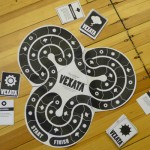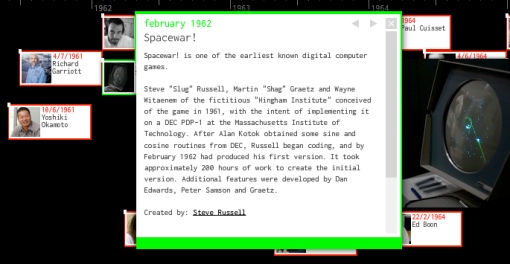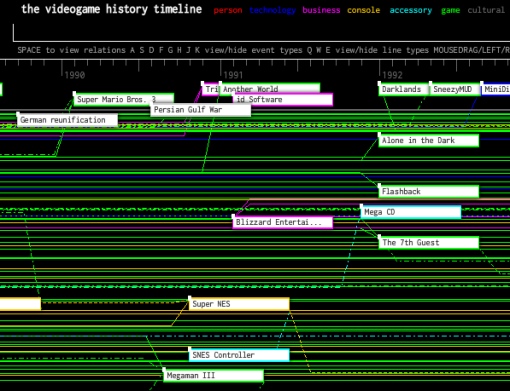Passage in 10 Seconds
If you never found the five minutes to play Jason Rohrer’s Passage, previously discussed, you can now play Passage in 10 Seconds as interpreted by Marcus Richert. Thanks to Jason Scott for the link.
If you never found the five minutes to play Jason Rohrer’s Passage, previously discussed, you can now play Passage in 10 Seconds as interpreted by Marcus Richert. Thanks to Jason Scott for the link.
We need to tag 64,000 photographs with expert data.
Thousands of people are going to come and help us, some for hours at a time, and we will attract them through the pleasure of play. How can tagging an archive of old photographs ever be an enjoyable experience?
Contemporary designers are more and more mixing play with work, and at Tiltfactor, we’re interested in how this happens, and how one can foster expertise in the process. We’re also interested in how values manifest in these data-driven systems. In making games for the social good, and games that result in real-world contributions, the designer must rely on ideas beyond innovative game mechanics and good old-fashioned playtesting. The data entry system for repositories such as databases need to be so enjoyable, well-organized, and instantly rewarding that people approach the tasks with motivation playfully like… a game.
Here’s an interview with me, on YouTube, focusing on ppg256.
“Façade tried to solve this problem by replacing the parrot with something more like a brain-damaged human; Heavy Rain, by comparison, is probably the best-trained parrot in history.” From Archie Bland’s Control freak: Will David Cage’s ‘Heavy Rain’ videogame push our buttons?
“Developing Games for 2020″
Bob Mitchell, ohai
Date: Thursday, February 25th
Time: 2:00pm
Place: Digital Media Theater, UCSC
Hosted By: Noah Wardrip-Fruin
Abstract
Students at UC Santa Cruz today will be among the engineers, artists, designers, and producers leading game teams in 2020.Review some of the changes to interactive entertainment over the last ten years in order to look ahead to the possibilities in 2020. The most obvious changes will be in the hardware our games run on. The more difficult predictions will be figuring out what our players want from their games.
I’m here in Banff (in Alberta, Canada) at the cutting edge, or maybe the precipitous edge, or, as I’d prefer to think, the connecting edge. The occasion is In(ter)ventions: Literary Practice at the Edge: A Gathering, organized by Steven Ross Smith.
The presenters include: Charles Bernstein, Jen Bervin, Christian Bök, J.R. Carpenter, Maria Damon, Ram Devineni, Craig Dworkin, Al Filreis, Christopher Funkhouser, Kenneth Goldsmith, D. Kimm, Larissa Lai, Daphne Marlatt, Nick Montfort, Erin Moure, Lance Olsen, Stephen Osborne, Kate Pullinger, Stephanie Strickland, Steve Tomasula, Fred Wah.
“The breadth of video game development” (working title)
John Davison, Executive Vice President of Content at GamePro
Date: Tuesday, February 23rd
Time: 2:00pm
Place: Digital Media Theater, UCSC
Hosted By: Chris Lewis, Noah Wardrip-Fruin
This lecture is free and open to the public, but visitors should purchase a parking pass from the visitor kiosk at the main entrance. There they can also provide a map showing the best parking for the Digital Media Theater.
“The breadth of video game development” (working title)
John Davison, Executive Vice President of Content at GamePro
Date: Tuesday, February 23rd
Time: 2:00pm
Place: Digital Media Theater, UCSC
Hosted By: Chris Lewis, Noah Wardrip-Fruin
This lecture is free and open to the public, but visitors should purchase a parking pass from the visitor kiosk at the main entrance. There they can also provide a map showing the best parking for the Digital Media Theater.
Some of the Tiltfactor team members are attending Toyfair this week researching product development and educational toys. We especially enjoyed meeting folks at Rubbing Hands, a small company in Connecticut. They showed us their games including Fred and Capture the Gag, which were very well designed with interesting play dynamics.
We in turn shared Vexata,

our awesome board game that manifests in the rules various human values. Aimed for the middle school market, it is informed by our work on Grow-a-Game!
I’m pleased to announce that I’ve released Space Invaders Enterprise Edition (Java, cross-platform executable), the first prototype program from my newly announced research direction, Zenet.
Space Invaders EE is a clone of code from Coke and Code, and as a tutorial for how to create games. However, it’s not the game itself we’re interested in (although it is pretty fun…)
The magic of Space Invaders Enterprise Edition is actually under the hood. I’ve separated out the game logic from the Java source into a file parsed by a rules engine. This means we can easily view the game design, without it getting muddled with too much implementation code.
“Players are Artists, Too”
Henry Lowood, Stanford University
Date: Thursday, February 18th
Time: 2:00pm
Place: Digital Media Theater, UCSC
Hosted By: Noah Wardrip-Fruin
This lecture is free and open to the public, but visitors should purchase a parking pass from the visitor kiosk at the main entrance. There they can also provide a map showing the best parking for the Digital Media Theater.
“Geração sobre a fala” (“My Generation about Talking,” Nick Montfort) Tradução para o português, Cicero Inacio da Silva.
“My Generation about Talking,” a text generator which I first presented at the Software Studies Workshop on May 21, 2008, is now available in Portuguese translation, thanks to Cicero Inacio da Silva. It was made for use in a presentation, but the program is set up to allow a user to play the entire presentation or to access any of the fifteen individual voices, each of which affirms repeatedly in some way.
Did you know Tiltfactor has a YouTube channel? We have videos on the lab in general, the Playcube events, news coverage of the game LAYOFF, video of Massively Multiplayer Mushu and Massively Multiplayer Soba, and more.
 “Animating the Gesture Style of Particular Individuals”
“Animating the Gesture Style of Particular Individuals”
Michael Neff, UC Davis
Date: Friday, February 12th
Time: 12:00pm
Place: Engineering 2, Room 599
Hosted By: Professor Marilyn Walker, Dept. of Computer Science
This lecture is free and open to the public, but visitors should purchase a parking pass from the visitor kiosk at the main entrance. There they can also provide a map showing the best parking for Engineering 2.
Proceedings of the Digital Arts and Culture Conference, 2009 are now online. The conference was a great success; DAC continued to lead the way in the culturally engaged study of digital art and media. Many thanks go to Simon Penny, who was director of the conference, and others at UIC: Ward Smith, Liz Losh, and Sean Voisen. The theme leaders for this conference put together very strong series of papers that were both focused and relevant. I hope those of you who didn’t make it to Irvine will visit the proceedings and see a bit of what happened at the latest instance of this extraordinarily rich series of gatherings, where the study of video games, digital art, digital literature, performance, and the cultural aspects of online and computing experience have been explored so well over the years.
Well, not quite that many, but 10,000,000 isn’t too shabby…
In this adaptation of Raymond Queneau’s 100,000,000,000,000 Poems, the rules of 10 sports (football, polo, water polo, lacrosse, ice hockey, table tennis, basketball, rugby, the Kirkwall ba’ and beach volleyball) are divided into their constituant elements (duration, playing area, objective, players per team, attire, ball and method of play/restrictions) in such a way that they can be reassembled without contradicting each other.
Searching for something suitably disruptive in the landscape of Australia, where Jacket is rooted, I found this. The first poem is made from sometimes misquoted bits of The Book of Common Prayer and Burroughs’s “The Cut-Up Method …” With technical and abstract language, folklore, Mallarmé, and guy-on-guy action, the book offers all sorts of utensil viewing. And later, in “but me,” this reflection:
My project, which began in
one room of the abyss, soon spread toward a perimeter
you can imagine, should you be inclined to do so.
 What do American Idol, lonelygirl15, and Invisible Children have in common?
What do American Idol, lonelygirl15, and Invisible Children have in common?
They were all instituted to function based off of mass audience interactions and they all deliver strong and dramatically-compelling narratives. The idea of interactive preexists video games and virtual worlds, and it’s alway refreshing to go back and examine new ways that interactivity plays out in our world today.
 I’m back from a nice slice of summer in Sydney, Australia. I spoke at the University of New South Wales when I was there, gave two talks at the Powerhouse Museum in connection with their “The 80s Are Back” exhibit, and was one of the three judges of the Global Game Jam Sydney. The people who participated in that event did some incredible work – congratulations to all. Here’s some video of me, at the Powerhouse Museum, on interactive fiction and on indie and 80s videogames.
I’m back from a nice slice of summer in Sydney, Australia. I spoke at the University of New South Wales when I was there, gave two talks at the Powerhouse Museum in connection with their “The 80s Are Back” exhibit, and was one of the three judges of the Global Game Jam Sydney. The people who participated in that event did some incredible work – congratulations to all. Here’s some video of me, at the Powerhouse Museum, on interactive fiction and on indie and 80s videogames.
Mauricio Giraldo Arteaga has completed a beta version of his extensive and well-designed Videogame Timeline. He’s also written a blog post about the project, in Spanish. The timeline contains people, technologies, businesses, platforms, accessories, and games and has a mode that shows connections between these items.


Powered by WordPress